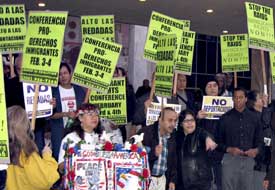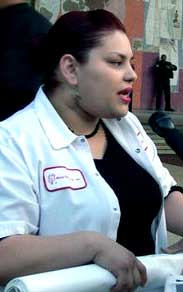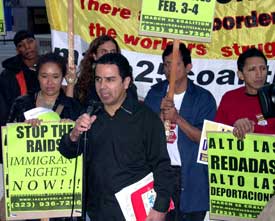Coalition plans May Day actions
In an historic development in the U.S. immigrant rights struggle, a coalition of national organizations met in Los Angeles on Feb. 3-4 to plan and coordinate the “Great American Boycott II” for May 1.
 Federal Building. " border="0"> Federal Building. " border="0"> Feb. 2 protest in front of Los Angeles Federal Building. WW photo: Dante Strobino |
Called by the March 25 Coalition, initiator of the 2006 May Day actions that brought millions into the streets, the coalition aims to defend immigrant workers and show their power by bringing “business as usual” to a halt across the country on May Day.
William Torres of the coalition described the boycott as “the ultimate fight for dignity and justice.”
After the 2006 actions, the U.S. Immigration and Customs Enforcement Agency (ICE) stepped up vicious raids and deportations in an attempt to stop immigrant workers from organizing.
In one of hundreds of examples, ICE combined union-busting with immigrant worker repression by arresting 21 workers at a North Carolina hog-processing plant on Jan. 24. The raid followed two major protests at the Smithfield plant: one initiated by Latina women to stop harassment over immigration papers, and another led by African-American workers to demand union recognition and Martin Luther King Day as a paid holiday. (Workers World, Feb. 2)
The Smithfield raids came after similar raids on thousands of workers at Swift and Co. meatpacking plants in six states on Dec. 12, 2006, when ICE agents terrorized and arrested workers from Mexico, Guatemala, Honduras, El Salvador, Sudan, Ethiopia and elsewhere.
 taking half the workforce, taking half the workforce,but she joined the Feb. 2 protest. " border="0"> ICE raided this Latina's job, taking half the workforce, but she joined the Feb. 2 protest. WW photo: Cheryl LaBash |
A press conference and demonstration condemning the raids, called by March 25 Coalition organizers on Feb. 2 outside the Los Angeles Federal Building, drew a militant 80 people. Two Latina women from a local factory raided the previous day came and described the brutalization by ICE agents, who had held guns to the heads of workers.
The next day Teresa Gutierrez of the New York May 1 Coalition and the International Action Center emphasized: “This conference gathers the movement to defend immigrant workers—from fighting ICE attacks to changing devastating day-to-day working conditions. By mobilizing in the streets, we defeated the Sensenbrenner bill. Together, we can stop the raids!”
Rep. Jim Sensenbrenner sponsored the racist and punitive H.R. 4437, passed by the U.S. House of Representatives in December 2005. One of its many discriminatory components was the proposed erection of a 700-mile wall along the U.S.-Mexican border. Because of massive worker protest in 2006, the bill died in the U.S. Senate.
Chito Quijano, of the progressive Filipino alliance BAYAN-USA and the California Nurses Association, recounted a call for help from a cousin, a documented worker and 20-year U.S. resident, arrested on a trumped-up charge by ICE and threatened with deportation. Quijano said: “Sensenbrenner was the fire that fed last year’s massive protest. This year, the raids will be the fuel.”
A plenary on “Globalization of Immigrant Labor and Transnational Capitalism” featured Teresa Gutierrez and William Robinson, professor of sociology at the University of California, Santa Barbara, and one of the leading U.S. academic critics of capitalism. Robinson outlined the growth of immigration and repression in the United States over the last 30 years, pointing out that contemporary “transnational capitalism” makes the profits it needs to sustain its existence through the value produced by low-wage labor of immigrants. To keep those profits it must maintain economic, legal and cultural control of immigrant workers.
 demands, "Stop the raids!" " border="0"> demands, "Stop the raids!" " border="0"> March 25 Coalition's William Torres demands, "Stop the raids!" |
Gutierrez highlighted the use of racism to divide the working class in its quest for profits. She cited recent inflammatory remarks by right-winger Pat Buchanan and former National Security Council member Samuel Huntingdon, that project when the United States will cease to have a “European” majority and characterize immigrants as threatening the country’s “national identity.”
Gutierrez posed a crucial question: “How, given the repression against immigrants, can we sustain the magnificent movement begun May Day 2006, and bring unity to the immigrant rights struggle?” She pointed out that the biggest fear of the right wing in the United States was that the immigrant question will cause all workers to question what kind of society the United States will be, and will raise the possibility of working-class unity across all nationalities.
The theme of working-class unity across borders wove through the proceedings. Javier Rodríguez, a March 25 Coalition convener, said: “This conference is significant because it is the first organized national effort to convene the major coalitions and groups that are more to the left, that initiated last year’s May 1 boycott. This is the movement that will attempt to coalesce to establish a historical alliance of Latin@s and African Americans. All the roots are here at this conference, with significant representation from both groups.”
Clarence Thomas, an initiator of the Million Worker March, member of International Longshore Workers Union Local 10 and the Alameda County Central Labor Council’s Executive Board, paid homage to the country and people of Mexico for their support in the historical struggle against U.S. slavery, and called for the absolute right of Mexican@s to travel across the U.S.-Mexican border without reprisals. He noted that on May 1, 2006, in the ports of Los Angeles and Long Beach, immigrant truckers refused to move shipping containers, shutting down 90 percent of the shipping. Those ports handle 40 percent of all container traffic coming into the United States.
Thomas vowed to return to Local 10 to ask that it participate in May 1 in a “meaningful way,” adding, “This is a rank-and-file movement, and that’s what’s keeping it afloat.”
Another emphasis of the conference was on international unity across borders, with a plenary featuring Pablo Franco Hernández of the Unión de Juristas de México and attorney for Oaxacan political prisoners, and Senator José Medina of the PRD (Partido de la Revolución Democrática) of Mexico. Both spoke of the movement against repression in the state of Oaxaca and its importance to the immigrant rights struggle within U.S. borders, tied as both movements are to resisting the misery and death wreaked by forces of capitalist globalization. The Popular Assembly of the People of Oaxaca organized massive demonstrations during 2006 for people-directed political autonomy; the Mexican government mounted violent reprisals, including arrests of Flavio Sosa and other leaders.
Medina called for an immediate end to massive deportations within the United States, and emphasized his opposition to any temporary worker program—“modern slavery to a handful of corporations.”
In a plenary on “History and Analysis of the Immigrant and Civil Rights Movement 1968-2006,” Ché López of the Border Social Forum chronicled the immigrant rights movement in North America from 1848 to the formation of his own organization in 2006, drawing together activists on both sides of the border to internationalize the struggle. He connected the new surge of organizing to a rise in class struggle against the current U.S. imperialist agenda, calling for May 1 to represent millions of immigrant and migrant workers all over the world as International Workers Day: “Social change needs to be created from the bottom, and will be by immigrants.”
Stating “I’m here to say the face of the immigrant rights movement is international,” Vicente Panamá Alba of the May 1 Coalition, New York, affirmed, “We are committed to mobilizing the international working class in New York for May 1.”
A video message from Elvira Arellano brought forward the special oppression and resistance of women immigrant workers. Arellano, founder of La Familia Unida Latina, has been in sanctuary in Chicago for six months in defiance of threatened deportation. She affirmed, “I am not a criminal. I am a mother and a father to my son. I fight so the undocumented people will be respected.”
Speakers and workshops at the conference emphasized the need to highlight the issues of immigrant women, such as their vulnerability to rape, sexual harassment and domestic violence when deportation can be used as a threat. Participants called for greater visibility and representation by women in the struggle, and stressed the leadership and resistance of women. One such leader was María Guardado, a former member of the FMLN, the liberation movement of El Salvador, who praised the conference as “a day to launch a great, important movement that is much needed, as we have to organize against the entire system that is the enemy of us all.”
National and transnational action reports and report-backs from the workshops including statements from religious leaders. Mohammed Hanif, imam with the Muslim American Society Freedom Foundation, vowed support, saying, “We are all brothers and sisters, to live together and fight together.” Bishop Filipe C. Teixeira, OFSJC, originally of Angola, said, “As a religious leader, as an immigrant man, I find in this conference ... unity with my brothers and sisters who are struggling.”
Northern California organizer Evelina Molina reminded workshop participants, “The farm worker movement was a class struggle. Let’s name this movement for what it is: a class struggle!” Molina helped organize 40,000 in May 2006 with KBBF’s “Voice of the Worker” in Santa Rosa—the first community-based non-profit Spanish language radio station, which celebrated 35 years in 2006.
Leon Waters of the People’s Hurricane Relief Fund drew the connections between the immigrant rights struggle and that of people displaced internally, like the survivors of Hurricane Katrina.
Walter Sinche from Pachamama Ecuadorian Organizations stated that the rights of Indigenous people throughout the Americas must be raised in the immigrant rights struggle. Sinche said he will march on May Day because it “is better to lose your job than your dignity.”
The need to close the disconnect between the anti-war movement and the immigration struggle and to educate the anti-war movement on the “other wars” in the United States, as well as the need for the immigrant rights struggle to endorse anti-war actions, was part of the report-back from the “U.S. Wars, Iraq and Immigration” workshop by Dianne Mathiowetz of the International Action Center-Atlanta.
Participating groups and organizations included Chispa, ELAC, Students for Immigrant Rights, APALC, South Asian Network, Korea Truth Commission, Hands Off Public Housing-New Orleans, Coalición de Derechos Humanos, Committee for Justice for Héctor Rivas, Mujeres Unidas Y Activas, Comité Pro-Amnistía Y Justicia Social, Jobs with Justice, TIGRA, Voices Crossing Frontiers/Voces Cruzando Fronteras, Unión del Barrio, P.U.E.B.L.O., UCLA Labor Center, IBT 808, U.S.-Cuba Labor Exchange, SEIU 660, Bay Area Teamsters, FIST—Fight Imperialism, Stand Together, National Lawyers Guild, Sex Workers Across Borders, Workers World Party, Freedom Socialist Party, World Can’t Wait, and Peace & Freedom Party.
The conference closed with agreement on the points of unity and recommendations for action.
A statement by Emma Lozano, Director of the Chicago-based Sin Fronteras/La Familia Latina Unida, was given to each participant. It read in part: “Even the best spokespeople in Congress call our people lawbreakers and say we must go to the back of the line. ... While they debate, we must demand a moratorium! We must resist. ... We must join in the boycott!”
Fernando Ledezma, a teacher and member of United Teachers Los Angeles, said, “Martin Luther King spoke of ‘content of character’ and I think it is critical to measure people not by what they are worth in money, but by how they contribute toward society. May 1 will be a celebration of measuring people by the content of their character.”
John Parker from the March 25 Coalition commented about the conference, “This is a great beginning towards building a strong and united movement towards May 1, 2007 that could stop the raids and deportations and make a significant contribution to the struggle to win full legalization rights for all workers. And, given the makeup of labor, immigrant rights, social justice and anti-war organizations that participated in this conference a great contribution to unity and strength has been made.”
Articles copyright 1995-2007 Workers World. Verbatim copying and distribution of this entire article is permitted in any medium without royalty provided this notice is preserved.


0 Comments:
Post a Comment
<< Home